 |
Previous Issues |
| Cedar Mill Community Website |
|
| About Cedar Mill News |
|
||||||
| Volume 7, Issue 1 | January 2009 |
|||||
|
 |
Claudia Reinsch leads a Young Musician class |
Group lessons are taught on the full-size keyboards in the main room and on smaller, five-octave keyboards in the smaller classroom mainly for the younger children. There are over 40 keyboards in the store-front facility, located in Cedar Mill Place across from Safeway on the south side of Cornell. Reinsch says, “We have found that most students enjoy the group lessons and stick with it longer than the average student will stick with private lessons. We do offer occasional private lessons for those group piano students who need extra help or are preparing for special performances or exams.”
Instruction is based on the Harmony Road program that was developed by Jan Keyser, a Portland-based music educator who founded the original Westside Music School and later sold it to Reinsch. Keyser’s program is used in over 100 schools around the world. She recently has been traveling to Asia where the program is popular and may be adopted by schools in China.
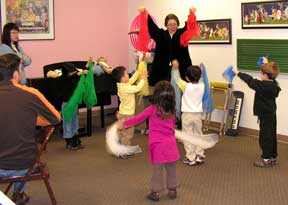 |
Kids in Suzanne Chittick’s "Music in Me" class had just been playing a song about snow and now they’re using scarves to mimic falling snow. Frequent activity breaks keep them from getting antsy! |
Harmony Road is a four-to-six-year program involving musicianship, ear training, singing, movement, rhythm, solo and ensemble keyboard (piano) performance, music reading and writing, arranging, composing and improvising. The beginning courses are age appropriate: Toddler Tunes for ages 1-1/2 – 3, Music in Me for 3-4, Harmony Road for 5-6, Young Musician for 6-7, Keyboard Prep for 8-12, and Piano Street for teen & adult beginners.
One of the important components of the program is expressive singing and solfege, the use of syllables (do, re, mi) to represent notes. Reinsch says, “Expressive singing can be singing songs with words or melodies with solfege syllables focusing not only on correct pitches and rhythms, but on expressing feeling or mood through phrasing, dynamics, etc.” She feels it’s confusing for children who are just learning to associate letters with words and reading to also use ABCs to identify musical tones. So the children alternate between playing melodies on the keyboard, singing the melodies, and playing and singing together.
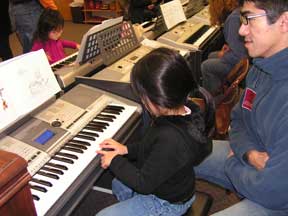 |
Parents are very important in the classes at Westside. Up to age eight or nine, children are accompanied by their parents who sit near them throughout the lessons. They help keep the kids on track and support their efforts with praise and attention. |
A supportive and low-stress approach is central to the philosophy of the school. Reinsch explains, “To counteract any negative connotations that the word “recital” may trigger in parents, we call our January and June performances “Family Night” programs, and include solo and ensemble performances. The teachers usually perform an ensemble as well, and we have refreshments. Also, when children begin performing at a young age, and have experienced performing in their group class, they look forward to the opportunity to shine.”
Students go home after each lesson with an assignment to learn for the next session. They are not required to practice for any set amount of time, but simply to work on the lesson. Parents get guidelines on how to be supportive and keep the kids on track, and are expected to supervise the practice sessions. Most of the students have at least an electronic keyboard at home. The school has a few used keyboards that they rent out to people, though with the low prices on portable keyboards these days, most people just purchase an inexpensive keyboard until they are ready to upgrade to either an acoustic or digital piano.
Reinsch explains that older and more advanced students, when they have completed the Harmony Road program, often continue on to, “intermediate and advanced group piano classes, which we have developed and are constantly “tweaking”, using materials from various publishers.”
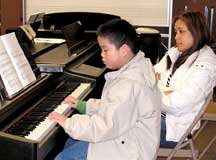 The school’s philosophy is expressed in a document titled, “Why We Teach Music,” which explains that, while music is science, math, history, a foreign language, and physical education, it is also art. It concludes:
The school’s philosophy is expressed in a document titled, “Why We Teach Music,” which explains that, while music is science, math, history, a foreign language, and physical education, it is also art. It concludes:
“It allows a human being to take all of these dry, technically boring, but fantastically difficult techniques, and use them to create emotion! That is the one thing that science cannot duplicate…humanism or feeling or emotion or call it what you will.
That is why we teach music. Not because we expect you to major in music; not because we expect you to play music all your life; not so you can have fun; not so you can trot around the football field in uniform…
But…So you will be human; so you will recognize beauty; so you will be sensitive; so you will be closer to an infinite beyond our world; so that you’ll have something to cling to; so that you will have more love, more compassion, more gentleness, more good. . . in short, more life. That’s why we teach music!”
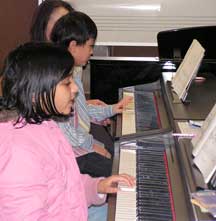 |
A student sings solfege syllables as she plays the notes |
During the breaks between semesters, Reinsch has taught the Yamaha Passport to Music Course on Crystal Cruises—a beginning keyboard course for adults that is taught on the sea days. She says, “Last summer, we took an 18-day Baltic Sea cruise, visiting Norway, Sweden, Denmark, Finland, Estonia, and St. Petersburg, Russia. I taught two classes a day on the three sea days. In March, I’ll be teaching on a cruise from LA to Hong Kong—lots more sea days, so a lot more teaching is involved.”
Reinsch comes from a musical family, her father played the trumpet, and her mother sang and played piano. Her three sons all play or played a variety of instruments and all were in the Sunset High band. She lives nearby in the Bethany area. She studied piano, organ and flute as a child, played in band and orchestra in school, and went on to receive a degree in music from the University of Redland in California. She continued to take graduate courses in applied music and piano teaching at various schools, and attends national music teaching seminars and conferences.
Although the main goal of Westside is to teach children the joy of music, some students go on to serious musical careers. A recent newsletter spotlights the Richmond family. Twins David and Emily both graduated from Harvard in 2006; David is pursuing a Master’s Degree in Bassoon performance at Rice, and Emily is working on a PhD in music history at Cal Berkeley. Younger sister Leslie is studying flute in Paris. Emily says that in her undergraduate teaching duties she draws on, “the ingrained love of music first instilled in me as a child at Westside Music School, where the pursuit of music was equal parts art, enjoyment, and community. These are the same values I aim to pass on now to my students, whether they have been playing an instrument for years or they are just now being introduced to Mozart.”
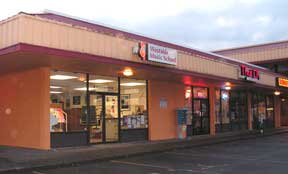 The business advertises a few times a year in local papers when sessions are beginning, but Reinsch says most of their new students are referred by current students and their families.
The business advertises a few times a year in local papers when sessions are beginning, but Reinsch says most of their new students are referred by current students and their families.
Reinsch just recently joined the CMBA. She says, “I’ve intended to join for a few years now, and finally took some action. It’s very easy to get isolated and spend all of my time at the Music School. I wanted to feel more a part of the community and get to know some of the folks who are my business neighbors. I also appreciate the projects of the CMBA to improve the community such as the landscaping and the donations to the homeless high school students.”
Westside Music School is located at 13486 NW Cornell Rd, just west of Murray. Their phone number is 503-626-7181, and their website is westsidemusicschool.org
Cedar Mill Business Association
Published monthly by Cedar Mill Advertising & Design
Publisher/Editor:Virginia Bruce
503-629-5799
PO Box 91061
Portland, Oregon 97291